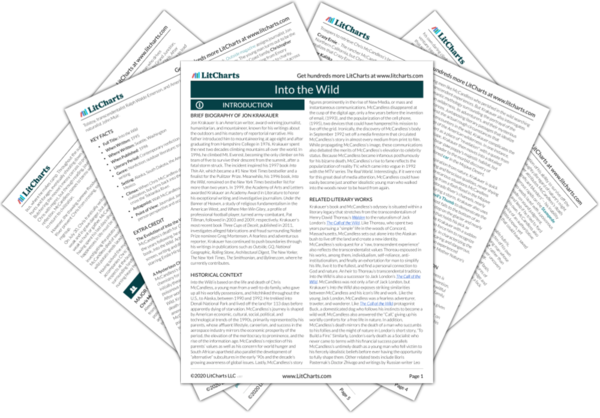Throughout Into the Wild, Krakauer describes McCandless's journey as a struggle between isolating himself from society and forging intimate relationships with others. While gregarious with the strangers he meets on the road, McCandless breaks off all contact with his family. While carrying on genial correspondences with his newfound friends, McCandless writes about "[feeling] extremely uncomfortable with society" in his journal.
McCandless's complicated relationships with others stem from his estrangement from his family, a break initiated by his discovery of his father's philandering in years past that sets Chris on a journey towards self-isolation. Krakauer characterizes McCandless's constant traveling as his way of running away from human connections: "McCandless wasÉrelieved that he had again evaded the impending threat of human intimacy, of friendship, and all the messy emotional baggage that comes with it. He had fled the claustrophobic confines of his family. He'd successfully kept Jan Burres and Wayne Westerberg at arm's length, flitting out of their lives before anything was expected of him. And now he'd slipped painlessly out of Ron Franz's life as well."
Though McCandless spurned human contact by leading a solitary life on the road and in the Alaskan bush, Krakauer notes how the very people McCandless evaded actually became surrogates for the family he was fleeing. Jan Burres shows a motherly concern for McCandless's wellbeing, Ronald Franz asks McCandless if he can adopt him, and Krakauer describes Wayne Westerberg's grain elevator workers as McCandless's "surrogate family." Meanwhile, McCandless's deep respect for Wayne supplants McCandless's broken relationship with his father, Walt. That McCandless sends his last postcard to Wayne, instead of Walt, speaks to his continuing disdain for his biological father and admiration for Wayne.
Even though McCandless ultimately cuts off contact with all his friends and family when he enters the Alaskan wilderness, his late journal entries show a young man coming to terms with his relationships with others and ready to reenter society. A highlighted passage from McCandless's copy of "Family Happiness" by Tolstoy reads, "He was right to say the only certain happiness in life is to live with others." That McCandless discovers a need for human contact through his solitary sojourn shows his reconciliation between his tendency to self-isolate and his deep need to connect with others.
Isolation v. Intimacy ThemeTracker

Isolation v. Intimacy Quotes in Into the Wild
In trying to understand McCandless, I inevitably came to reflect on…the grip wilderness has on the American imagination, the allure high-risk activities hold for young men of a certain mind, [and] the complicated, highly charged bond that exists between fathers and sons.
The trip was to be an odyssey in the fullest sense of the word, an epic journey that would change everything. [McCandless] had spent the previous four years, as he saw it, preparing to fulfill an absurd and onerous duty: to graduate from college. At long last he was unencumbered, emancipated from the stifling world of his parents and peers, a world of abstraction and security and material excess, a world in which he felt grievously cut off from the raw throb of existence.
McCandless…relieved that he had again evaded the impending threat of human intimacy, of friendship, and all the messy emotional baggage that comes with it. He had fled the claustrophobic confines of his family. He’d successfully kept Jan Burres and Wayne Westerberg at arm’s length, flitting out of their lives before anything was expected of him. And now he’d slipped painlessly out of Ron Franz’s life as well.
Both father and son were stubborn and high-strung. Given Walt’s need to exert control and Chris’s extravagantly independent nature, polarization was inevitable. Chris submitted to Walt’s authority…but the boy raged inwardly all the while. He brooded at length over what he perceived to be his father’s moral shortcomings, the hypocrisy of his parents’ lifestyle, the tyranny of their conditional love. Eventually, Chris rebelled—and when he finally did, it was with characteristic immoderation.
More even than most teens, he tended to see things in black and white. He measured himself and those around him by an impossibly rigorous moral code.
As a youth, I am told, I was willful, self-absorbed, intermittently reckless, moody. I disappointed my father in the usual ways. Like McCandless, figures of male authority aroused in me a confusing medley of corked fury and hunger to please. If something captured my undisciplined imagination, I pursued it with a zeal bordering on obsession, and from the age of seventeen until my late twenties that something was mountain climbing….Climbing mattered.
Two years he walks the earth…an aesthetic voyager whose home is the road….After two rambling years comes the final and greatest adventures. The climactic battle to kill the false being within and victoriously conclude the spiritual revolution….Ten days bring…him to the great white north. No longer poisoned by civilization he flees, and walks alone upon the land to become lost in the wild.
Many people have told me that they admire Chris for what he was trying to do. If he’d lived, I would agree with them. But he didn’t, and there’s no way to bring him back. You can’t fix it. Most things you can fix, but not that. I don’t know that you ever get over this kind of loss. The fact that Chris is gone is a sharp hurt I feel every single day. It’s really hard. Some days are better than others, but it’s going to be hard every day for the rest of my life.
















